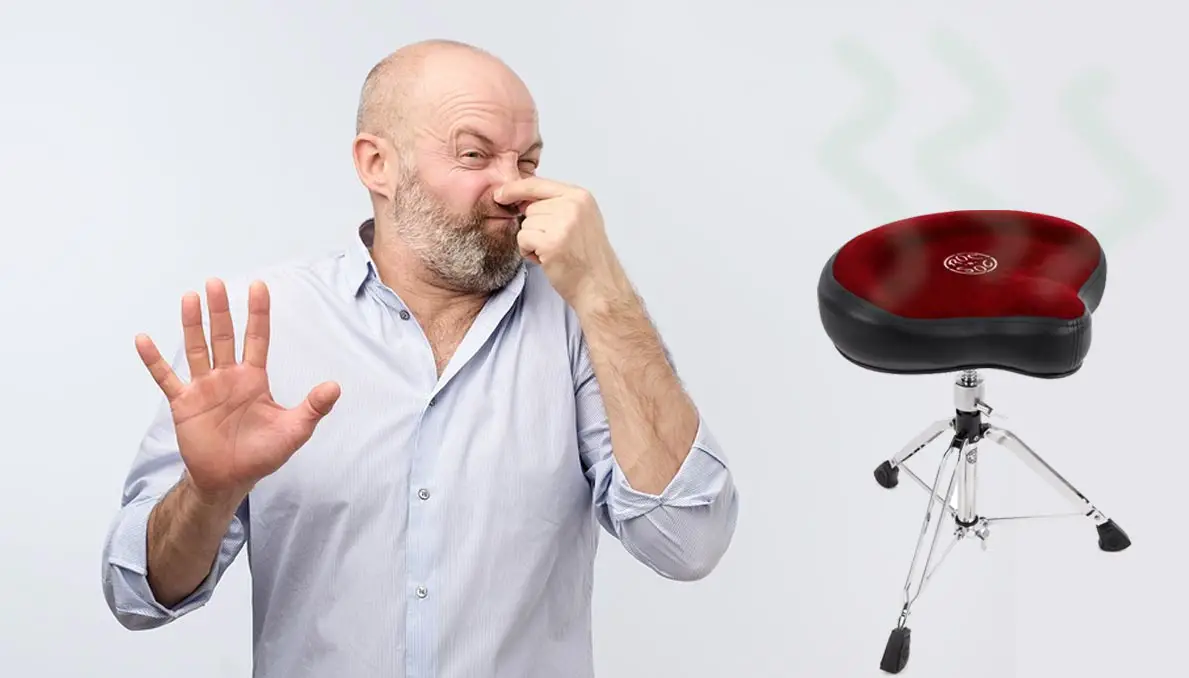A drummer burns anywhere between 400 to 600 calories an hour. Whether it’s the pure energy needed to keep on time and still have your own style or the fact that most clubs and bars have bad air conditioning systems, it’s no wonder why these rhythmic musicians always end the show drenched in sweat and entirely exhausted.
However, with great levels of sweat comes not so great odors. That’s why it is no surprise to any real drummer that the drummer’s throne is the part of the drum set that receives the most damage and needs the most attention.
To clean a drum throne, follow these steps:
- Mix together 1 part dish soap with 4 parts water. Apply to top of throne and allow to sit for a minute before scraping off.
- Spray vinegar onto tough stains, scrub with a brush and allow to air dry.
- Finish eliminating the odor by sprinkling baking soda on the throne, then allow to sit in the sun for a few hours before vacuuming the baking soda up.
But, what does cleaning a drum throne entail, how do you get rid of these unwanted odors once and for all, and why should you clean your throne other than odor in the first place? To answer these questions, let’s break down each subject and determine what the crux of throne cleaning truly is.
How To Remove Unwanted Odors From Your Drum Throne
Cleaning your throne and removing the odors truly go hand in hand. The process needed to remove these odors is a bit more in-depth which is why it should be utilized over other throne cleaning processes for its attention to detail in general. To outline the cleaning process, we must first start with the cleaning mixture and how to apply it.
- Mix together one part laundry or dish soap with 4 parts water. Next, apply just the suds on top to the throne itself. Use a good brush that isn’t too rough to find that balance between scrubbing and scratch marks. Let the suds sit on top of the throne cushion for about a minute before scraping them off and letting the throne air dry.
- Tough stains can easily be removed with vinegar and can also mask strong smells as well. Simply spray vinegar with a spray bottle on the affected area, scrub with a brush, and then air dry in the sun. If you aren’t a fan of the smell of vinegar either, you can always spray it with a scent after the fact as well.
- After all other steps are completed, finish by eliminating the odor through the means of baking soda. Simply sprinkle baking soda on the throne, bring it outside on a non-humid day in the sun for a few hours, then vacuum the baking soda up. You can also spray your throne with vinegar as well if needed.
If you have a pet that loves to call your throne home, use rubber gloves to rub across the cushion and lift the hairs and debris first, before cleaning the drum throne. After that, you can use the vacuum to remove these elements and be left with a clean pet hair-free throne.
By following these simple steps, you can keep your throne in perfect condition, have a more viable return on investment because of it, and never deal with the ‘what’s that smell?’ question far too many drummers are asked daily ever again. You can also use instrument-specific cleaning supplies for a more safe and better clean if you want to truly keep your throne in pristine condition for as long as possible. If your throne is highly expensive, this extra financial decision may be just the thing to ensure that your throne was cost-effective and ran its full course accordingly.
 Why Clean Your Drum Throne to Begin With?
Why Clean Your Drum Throne to Begin With?
When determining whether or not cleaning your throne is even something you want to take the time to do in the first place, you have to think about the myriad of pros associated with a clean throne and how this small bit of work can significantly impact the longevity and cleanliness of your throne for years.
Other than the foul odor associated with your throne, there is also the common wear and tear that is exacerbated due to a lack of care as well as the hygiene side of things that demands your throne is clean and odor-free for your health and all those that use your throne likewise.
According to Portland State University, “The average sample bus seat contained about 80 bacteria colonies.” This number is strikingly similar for thrones and is all the more reason to clean them and keep yourself germ-free. As the bacteria grows on your seat, you open yourself and others up to more and more illnesses and germs alike. You also can avoid foul odor to begin with as most of this odor stems from the bacteria on these seats anyhow.
Furthermore, because the average throne lasts anywhere between 6 and 10 years, the way that you treat your throne and clean it is highly important. If you disregard the state that your throne is in, you will only lead to its shorter lifespan and also never remove that unwanted odor.
Proper maintenance rests at anywhere between weekly to monthly cleanings and while you could absolutely have a person come clean it for you, it is truly something that can easily be done on your own with vinegar, soap, and baking soda.
Fun Fact: ‘Why is a Drummer’s Seat Called a Throne?’
 The original reason for referring to the drummer’s seat or drum chair as the throne is due to the implied position that the drummer holds in the band. As Kings and Queens would sit upon their thrones as the implied leaders of their lands, the drummer sits upon their throne as the one that holds the band together through rhythm.
The original reason for referring to the drummer’s seat or drum chair as the throne is due to the implied position that the drummer holds in the band. As Kings and Queens would sit upon their thrones as the implied leaders of their lands, the drummer sits upon their throne as the one that holds the band together through rhythm.
We’ve all seen a band at least once completely fall apart on stage from an out-of-touch drummer doing their own thing, and while it may have been embarrassing for the bandmates, it also goes to show that without a good drummer, many bands would fail. Think of Neil Peart, Dave Grohl, John Bonham, and even Ringo Starr (mostly because of his notorious drum lines).
Without the drummer, the band can’t keep in time and thus, the drummer sits upon a proverbial throne. While the seat may not represent leadership in every band, the concept of the drummer being the one that holds the band together and keeps them on time is truly interesting and relatively accurate. As a metronome is used to keep time, so is the drummer and this is where their power lies.
In Conclusion
Whether you’re a drummer that ‘holds your band together through rhythm’ or a concerned band member sick and tired of spending your practices covering your nose, the need to clean a drummer’s throne is not only obvious but essential for countless reasons. Whether you choose to simply sprinkle some baking soda on the cushion or do an all out cleaning session, the longevity and cleanliness of your throne truly all depends on the care you put into it.
For more cleaning supplies to add to your drum maintenance arsenal, check out our comprehensive list of drum cleaning supplies and accessories today!


